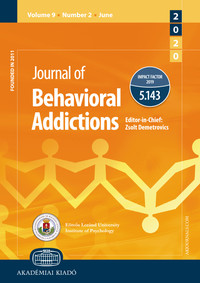The prevention paradox applies to some but not all gambling harms: Results from a Finnish population-representative survey
The prevention paradox applies to some but not all gambling harms: Results from a Finnish population-representative survey
Author(s): Matthew Browne, Rachel Volberg, Matthew J. Rockloff, Anne H. SalonenSubject(s): Behaviorism
Published by: Akadémiai Kiadó
Keywords: gambling harms; population survey; problem gambling; prevention paradox
Summary/Abstract: The Prevention Paradox (PP) suggests that a large proportion of aggregate harm from gambling occurs to people who do not have a gambling disorder. However, it has not yet been tested using a population-representative sample. We aimed to test whether the PP applies to gambling in Finland. The prevalence rates of diverse harmful consequences from gambling were surveyed amongst a population-representative sample of past-year gamblers. Methods. The study used first wave data (N = 7,186) of Finnish Gambling Harms survey, collected via online and postal surveys in 2017. A subset of 3,795 adults (≥18 years), who had gambled at least monthly in 2016, were selected for analysis. Measurements. Gambling-related harms were evaluated with the 72-item Harms Checklist. Problem and Pathological Gambling Measure (PPGM) measured respondents’ probable disordered gambling from the subset of items for impaired control (4 questions) and other issues (3 questions). Findings. Consistent with previous findings, the majority of harms were reported by those in the less severe PPGM categories (i.e. scoring <5). However, considering each domain separately, this was true only for financial, emotional/psychological, and work/study harms. The PP was not supported for health, relationship, or social deviance harms. Conclusions. The population prevalence of the most serious harms (e.g. unsafe living conditions) is concentrated among those with severe impaired control issues. However, even excluding the ∼15% of harms occurring to occasional gamblers, most financial, emotional and work/study impacts occur to those with lower levels of control issues. Efforts at harm reduction should focus on the entire spectrum of issues that people experience from their gambling.
Journal: Journal of Behavioral Addictions
- Issue Year: 9/2020
- Issue No: 2
- Page Range: 371-382
- Page Count: 12
- Language: English

